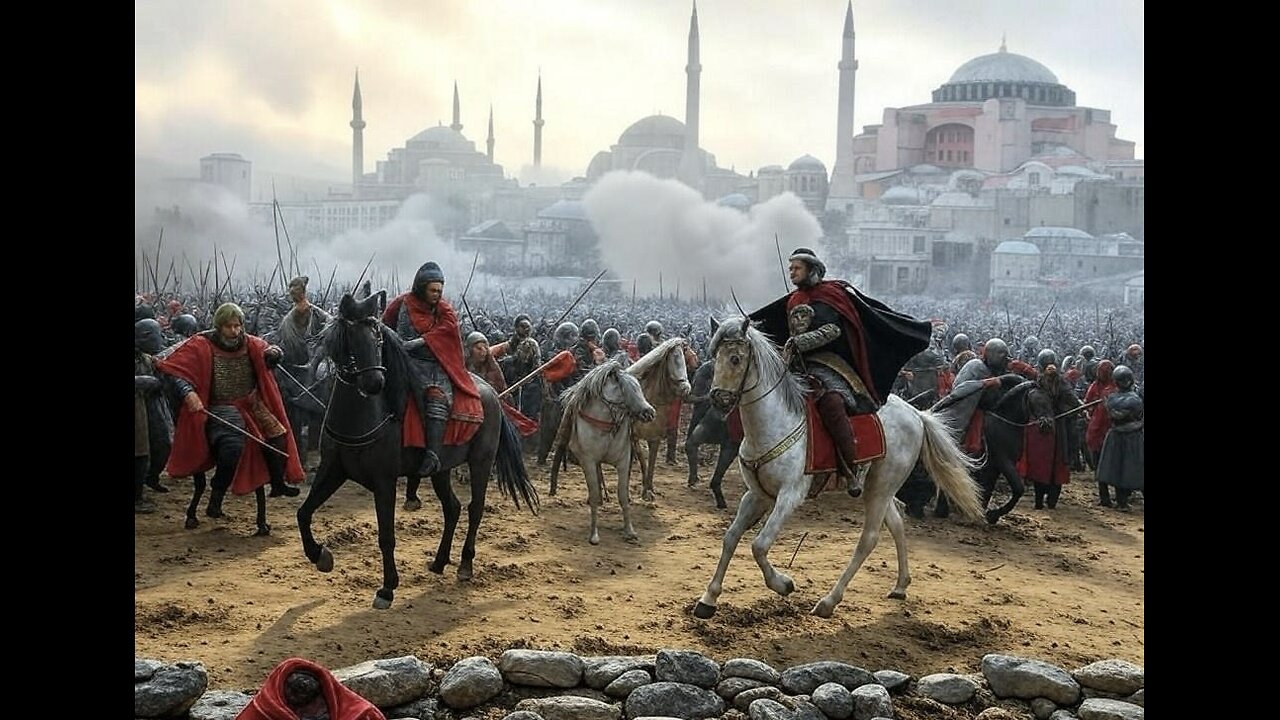Premium Only Content

The fall of Constantinople
The fall of Constantinople, which occurred on May 29, 1453, was a pivotal event marking the end of the Byzantine Empire and the rise of the Ottoman Empire as a major power in Europe and the Near East. Here's a concise description of the event:
The Fall of Constantinople (1453):
- Background: Constantinople, once the grand capital of the Eastern Roman (Byzantine) Empire, had been in decline for centuries due to internal strife, economic troubles, and repeated sieges by various powers. By 1453, it was a shadow of its former glory, with a significantly reduced population and weakened defenses.
- The Siege: The Ottoman Sultan Mehmed II, known as "Mehmed the Conqueror," launched a massive siege on Constantinople. His army, equipped with new technology like large cannons, including the famous "Basilica" cannon, besieged the city. The siege lasted for nearly two months, with several unsuccessful attempts to breach the walls until the final assault.
- The Attack: On the morning of May 29, 1453, after intense bombardment, Ottoman forces managed to breach the walls near the Gate of St. Romanus. Despite fierce resistance, the city's defenders, led by Emperor Constantine XI, were overwhelmed by the sheer numbers and strategic prowess of the Ottoman troops.
- The Capture: Constantine XI died during the battle, and Constantinople fell to the Ottomans. The event is often remembered for the brutal sack of the city that followed, although Mehmed II quickly moved to restore order, converting the Hagia Sophia into a mosque and repopulating the city to reestablish it as the Ottoman capital.
- Consequences:
- Political: The fall of Constantinople ended the Byzantine Empire, which had lasted over 1,000 years. It cemented Ottoman control over the eastern Mediterranean and established Istanbul (renamed from Constantinople) as a major cultural and political center.
- Religious: The event marked a significant shift in the religious landscape, with Islam becoming more dominant in the region. The conversion of Hagia Sophia symbolized this change.
- Cultural: The influx of Greek scholars to the West before and after the fall contributed to the Renaissance, bringing with them ancient texts and knowledge.
- Legacy: This event has been seen through various lenses over time - as a tragic loss for Christendom by some, a glorious conquest by others, and universally as a turning point in world history.
The fall of Constantinople is not just a military event but a profound cultural and historical shift, influencing the course of European, Middle Eastern, and global history.
-
 LIVE
LIVE
LFA TV
16 hours agoBREAKING NEWS ALL DAY! | FRIDAY 9/26/25
5,072 watching -
 LIVE
LIVE
Chicks On The Right
3 hours agoComey's FAFO moment, Dallas sniper details, DFWYF, and who to trust in media.
2,385 watching -
 LIVE
LIVE
Welcome to the Rebellion Podcast
16 hours agoYou Made it to FriJay - WTTR Podcast Live 9/26
332 watching -
 1:29:14
1:29:14
Game On!
17 hours ago $1.34 earnedNFL Week 4 Betting Report Preview!
10.4K2 -
 21:05
21:05
Adam Does Movies
22 hours ago $1.22 earnedAlien: Earth Episode 8 - Recap
9.88K3 -
 18:49
18:49
World2Briggs
19 hours ago $1.57 earnedTop 10 States To retire in 2026 According to Experts
12.5K4 -
 19:03
19:03
Blackstone Griddles
14 hours agoParmesan Ranch Chicken Sandwich oxn the Blackstone Griddle
11.9K3 -
 2:00:29
2:00:29
BEK TV
1 day agoTrent Loos in the Morning - 9/26/2025
13.1K -
 LIVE
LIVE
The Bubba Army
23 hours agoJimmy Kimmel's Audience Plummets by 20 MILLION! - Bubba the Love Sponge® Show | 9/26/25
1,190 watching -
 17:24
17:24
Sponsored By Jesus Podcast
22 hours agoLoving Our ENEMIES & Praying for Those Who Hurt Us
13.7K5